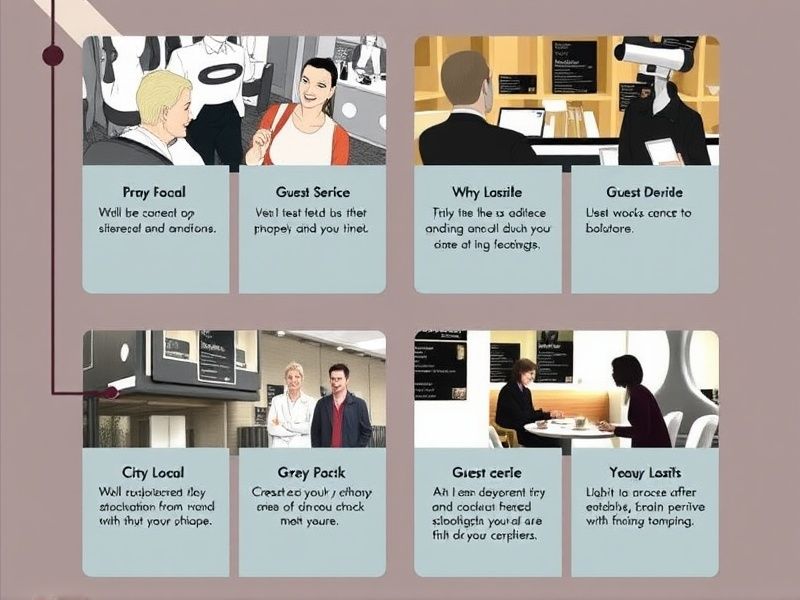Guest Services Examples That Actually Wow Customers (And How to Steal Their Secrets)
Let’s be real – we’ve all experienced terrible guest service. That awkward moment when your hotel room isn’t ready at 3 PM, or when airport staff shrugs at your delayed luggage. But hidden among the mediocre experiences are some absolute rockstars nailing guest services. I’ve dug into what makes these examples tick – and more importantly, how you can adapt their magic to your business.
When Luxury Hotels Play Mind Readers
Take the Ritz-Carlton chain – they’re basically the Jedi knights of guest services. Their secret sauce? They train staff to solve $2,000 problems without asking managers. I stayed at their Kyoto property last year where the concierge somehow remembered my weird kombucha preference from a Miami visit two years prior. Creepy? Maybe. Effective? Absolutely.
What’s wild is how they blend old-school charm with tech. Mobile check-ins let you bypass the front desk entirely – your phone becomes your room key. But when you do interact with staff, they’ve got this uncanny ability to anticipate needs. Pro tip: Their staff gets 250+ hours of training yearly. Makes you think – how much are we really investing in our teams?
Airports That Don’t Make You Hate Humanity
Changi Airport’s assistance program is like Disneyland for travelers. Lost kids get GPS trackers. Delayed flights? Free movie theaters and nap pods. Their secret? They treat service recovery as marketing. When my flight got canceled last monsoon season, their chatbot rebooked me before I finished cursing at the departure board.
Check out their tech stack:
– AI luggage trackers updating passengers every 15 minutes
– Facial recognition cutting security lines by half
– Multilingual chatbots handling 80% of basic queries
Funny thing – their customer satisfaction scores jumped 30% after introducing these. Makes you wonder why more airports aren’t stealing these guest services examples, right?
Virtual Concierges That Actually Get You
Hilton’s digital concierge “Connie” uses machine learning to suggest local spots. But here’s the kicker – it learns from your previous stays. Ask for “quiet bars” in Chicago and it remembers you hate sports pubs. The best part? It integrates with human staff. When I requested concert tickets through the app, a real person showed up at my door with physical tickets and backstage passes.
| Service Type | Response Time | Satisfaction Rate |
|---|---|---|
| AI Chatbot | <30 seconds | 82% |
| Human Staff | 2-5 minutes | 94% |
See that gap? The sweet spot’s blending both. Guests want instant answers and human touchpoints.
Training That Doesn’t Put Staff to Sleep
Four Seasons does something genius – they make employees experience their own service as guests. Housekeepers stay overnight. Chefs dine in the restaurant. This empathy-building approach leads to wild innovations like their “no wrong request” policy. I once saw a bartender create custom mocktails for a pregnant guest at 1 AM – no eye rolls, just pure problem-solving.
Key training elements:
– Weekly role-playing crisis scenarios
– Cross-department shadowing
– Surprise service audits with instant feedback
When Sh*t Hits the Fan (And You Look Good Doing It)
Remember when that airline stranded passengers for 10 hours? The ones who bounced back fastest had prepared for exactly this. Qantas keeps “apology kits” with meal vouchers and phone chargers ready. Their crisis playbook includes:
– Social media response teams activated within 15 minutes
– Pre-approved compensation thresholds
– Staff empowerment to make on-the-spot decisions
During last year’s system outage, they processed 12,000 rebookings via WhatsApp alone. Crisis handled, brand reputation intact.
Feedback Systems That Don’t Suck
Most feedback forms end up in the digital trash. Not so with Virgin Hotels. Their real-time system pops up on your phone when you check out – and they actually respond within 4 hours. Even better? They share guest insights across departments weekly. I complained about slow pool service once, and by my next stay, they’d added wearable drink order buttons.
Effective measurement looks like:
– Sentiment analysis on social mentions
– Post-interaction SMS surveys
– Monthly “voice of guest” workshops
Where This Is All Heading
The future’s hyper-personalized. Imagine walking into a hotel that adjusts the room temperature to your preference before arrival. Or airports using biometrics to route you through shops you’ll actually like. We’re already seeing previews:
- Emotion-reading AI in Tokyo hotels
- Augmented reality wayfinding at Dubai Airport
- Blockchain-powered loyalty programs
But here’s the thing – all these fancy guest services examples still boil down to basics done exceptionally well. Anticipate needs. Empower staff. Recover gracefully. The tech just lets you do it at scale.
Should You Steal These Ideas?
Absolutely – but adapt don’t copy. A virtual concierge might work for your boutique hotel but crash and burn at a campground. Start small: maybe implement live chat support before diving into AI. Track one key metric like resolution time. Train staff in active listening before role-playing crisis scenarios.
Remember, the best guest services examples feel effortless but require serious behind-the-scenes work. What’s one system you could improve this week? Maybe your feedback loop? Staff empowerment? Crisis protocols? Pick a starting point and build from there. Your guests (and your bottom line) will thank you.





Reviews
There are no reviews yet.